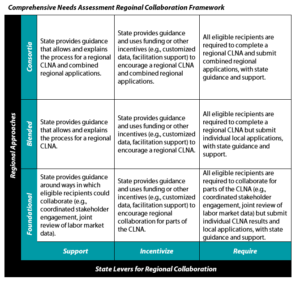One of the most significant and exciting changes introduced in the Strengthening Career and Technical Education for the 21st Century Act (Perkins V) is the new comprehensive local needs assessment (CLNA). The purpose of the CLNA is to support data-driven decisionmaking and more closely align planning, spending and accountability activities under Perkins V. All local activities – and funding – must align to the findings of local needs assessment. This represents a major sea change in how most states and locals currently support and fund Career Technical Education (CTE), one that brings both opportunities and challenges.
To support states in this undertaking, Advance CTE convened a Shared Solutions Workgroup, with support from the Association of Career and Technical Education and funded by the Bill & Melinda Gates Foundation. The Workgroup – comprised of state and national leaders – is charged with informing and contributing to the development of resources and tools for the benefit of all states, as they guide local recipients in conducting rigorous CLNA that drives program quality, equity and access.
Today, Advance CTE is releasing the second two deliverables from this Workgroup: Promoting a Regional Approach to the Perkins V Comprehensive Local Needs Assessment and Investing in Quality: Funding the Perkins V Comprehensive Local Needs Assessment.

Many states are looking to the CLNA – and Perkins V more broadly – as an opportunity to promote stronger collaboration and alignment across secondary and postsecondary systems and across CTE and workforce development. Promoting a Regional Approach provides a framework, self-assessment, guidance and key questions to help states considering leveraging the CLNA process to foster regional collaboration – covering the why, what and how of such an approach.
Regardless of what approach a state takes, a well-organized and data-driven CLNA process that leads to strategic decisions and program improvement will require significant capacity and resources. Investing in Quality identifies potential funding streams to support the CLNA to help make the case for such investments.
All of Advance CTE’s and partners’ Perkins V resources can be found here.
Kate Kreamer, Deputy Executive Director

